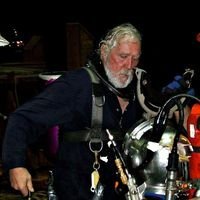Leaderboard
-
in Blog Entries
- All areas
- Adverts
- Advert Questions
- Advert Reviews
- Links
- Links Comments
- Links Reviews
- Videos
- Video Comments
- Articles
- Article Comments
- Article Reviews
- Images
- Album Comments
- Album Reviews
- Albums
- Files
- File Comments
- File Reviews
- Events
- Event Comments
- Event Reviews
- Blog Entries
- Blog Comments
- Posts
- Status Updates
- Status Replies
-
All time
-
All time
November 25 2010 - May 20 2024
-
Year
May 20 2023 - May 20 2024
-
Month
April 20 2024 - May 20 2024
-
Week
May 13 2024 - May 20 2024
-
Today
May 20 2024
- Custom Date
-
All time
Popular Content
Showing content with the highest reputation since 11/25/2010 in Blog Entries
-
2 points[indent][indent][indent][indent][indent][i]The public see these fines as the value the courts put on human life. Widows and families are shattered by the size of them. What do sums of a few hundred pounds mean to these companies? They spend more in the bar afterwards than they pay in fines.[/i][/indent][/indent][/indent][/indent][/indent] [indent][indent][indent][indent][indent][indent][indent][indent]—— Roger Lyons Burgoyne Committee, [i]Glasgow Herald[/i], June 24, 1981[/indent][/indent][/indent][/indent][/indent][/indent][/indent][/indent] In Scotland, it is a matter of public policy for prosecutors to use their office to stamp out crime.[sup]2[/sup] They see the arrest and conviction of lawbreakers as part of their duty to safeguard the public interest, and punishment “a valuable component of the criminal justice process, largely because of its capacity to deter future crime.”[sup]3[/sup] But not all violations of the criminal code are viewed equally. Murder, rape, robbery, for example, occupy a higher echelon than say public drunkenness or driving without a license. And when it comes to crimes against the industrial labor force, Professor Carson says Britain has had a long history of placing corporate crime into a special category where it was “rarely thought of as ‘real’ crime.”[sup]4[/sup] Moreover, as this view penetrated the modern day offshore arena, tolerance towards infringement of the regulations became so pervasive and “institutionalized at a fairly high level,”[sup]5[/sup] that when oil companies were actually caught violating the law, those violations were “only rarely subjected to criminal prosecution.”[sup]6[/sup] Indeed, the Diving Inspectorate had the power to prosecute wrongdoers, but preferred instead to rely upon exhortation to convince contractors to mend their ways.[sup]7[/sup] Added to this dynamic were other troubling factors. Carson discovered that the legal branch of the Department of Energy and the Scottish legal system did not always see eye to eye “over whose responsibility it was to lay the groundwork for possible prosecution.”[sup]8[/sup] And London was not always anxious to cooperate with the investigations of Scottish prosecutors,[sup]9[/sup] refusing in one case to comply with a fiscal’s request for a copy of a lease which would have established the identity of a concession owner,[sup]10[/sup] and managing to persuade Scottish authorities not to prosecute an offender, in another.[sup]11[/sup] This tension between the two legal powers spilled over into another fundamental law enforcement area. DOE officials believed it was the job of the police to investigate criminal activity and the coroner’s inquest to decide whether there were grounds for prosecution. But north of the border, Carson interviewed a fiscal who said it was not the job of the police officer to go offshore “looking for offences.” That was the job of the DOE inspector.[sup]12[/sup] Still, even if inspectors were inspired to look for lawbreakers, Parliament had removed any chance of catching them in the act. Unlike their Norwegian counterparts, who had the power to make sudden inspections without notice, UK inspectors were required to give the oil operator advance notice when they intended to fly out to have a look.[sup]13[/sup] The Department’s reluctance to prosecute is not surprising when one takes into account that bringing an oil company to court was inherently at odds with its role as sponsor. When Energy Secretary Tony Benn held up a bottle of crude oil in front of press reporters in 1975 and declared, “I hold the future of Britain in my hand,”[sup]14[/sup] he wasn’t just rallying the country with an inspirational slogan; he was pledging official support. To men like Commander Warner who worked under Secretary Benn, that declaration must have resonated deep within their spines because they had to know that shutting down operations and hauling rule breakers off to court was not going to help get the country out of its economic mess. As Commander Warner best describes the situation, “there were no ‘Brownie points’ for convictions.”[sup]15[/sup] Lastly, one must never discount the power of the Association of Offshore Diving Contractors. Had Chief Inspector Warner taken a harsh stand against offenders, the AODC would not have taken the matter lying down. Complaints from the Association would have rained down upon the oil companies, who in turn would have brought pressure to bear upon Warner’s superiors. When this scenario was put to one of the leading diving contractors of that era, he was unable to suppress a smile: “We would have worked it that way, so none of us are totally innocent.” While the DOE was reluctant to prosecute, Carson discovered that the agency was not alone in that feeling.[sup]16[/sup] Against the usual rhetoric about “safeguarding the public interest,” and prosecution being “a deterrent,” it turns out that Scottish authorities also ranked offshore crime far down on its list of illegalities. Among government records, from 1977 to 1980, Carson found 29 reported fatalities, 168 serious accidents, and 368 dangerous occurrences involving all aspects of offshore work, diving and non-diving alike.[sup]17[/sup] And yet, Carson was able to find only 13 cases where prosecutors had initiated criminal proceedings.[sup]18[/sup] These 13 cases (involving 23 companies or individuals) concluded with ten convictions, four not guilty, four deserted, and five dismissed as incompetent.[sup]19[/sup] Moreover, even when the accused were found guilty, the level of fines was so deplorably low that it made the conviction virtually meaningless. In the 1977 K. D. Marine case, for example, when divers Howard Spensley and Charles Meehan drowned, the company and the diving supervisor were fined £200 and £25 respectively after pleading guilty to one of the charges. In 1978, after Philip Baxter of Dundee fell 80 feet to his death through a badly fixed grating, Shell Oil was convicted of negligence and paid a fine of £200.[sup]20[/sup] These fines were near the level of what might be imposed for a serious motoring offense in Scotland, such as driving while drunk or without insurance. Besides illustrating the degree to which negligent acts were being punished, the magnitude of these fines reflects the prosecutor’s view of the seriousness of the crime and his judgment of the accused. In Scotland, he plays no part in recommending to the sheriff what sentence should be imposed upon a convicted offender. But he does affect the sentencing when he chooses what prosecutorial procedure to employ. With the exception of the Infabco trial, all the defendants in Carson’s study were prosecuted by the less time-consuming, less expensive procedure of Summary Complaint rather than by the more serious process of Indictment. This decision was not insignificant because Parliament had restricted the maximum penalty upon conviction by Summary Complaint to £400, whereas a company convicted on Indictment could have received a larger fine at the discretion of the sheriff. Thus, when the fiscal chooses summary procedure, he not only limits the sentencing options of the judge, he is also “in effect helping to define what constitutes serious crime,” as legal experts Moody and Tombs point out.[sup]21[/sup] And it’s clear from the record that during the 1970s, authorities did not view the types of infringement going on offshore as serious crime. As for the accused, the likelihood of serving jail time was more a legal fiction than a reality. In 1979, when Richard and Skip died, the Crown was not indicting company directors for their managerial actions. According to Health and Safety expert Gareth Watkins, more than a decade would have to pass before Britons would hear of a managing director in the UK being found guilty of manslaughter.[sup]22[/sup] And it would not be until 1997 that a person working in the North Sea oil industry,[sup]a[/sup] would receive a prison term for committing a crime offshore.[sup]23[/sup] Furthermore, had Infabco been convicted in 1980, it is unlikely that the court would have imposed an exemplary fine on Masterson’s company. More likely Infabco would have received a small fine as was the case when Sub Sea Offshore[sup]b[/sup] lost two divers in 1984. On February 21, David Bowmar and Thomas Mackey died while performing a welding test in a hyperbaric chamber at Sub Sea’s base of operations on Greenwell Road in Aberdeen. The supervisor neglected to analyze one of the gas mixtures to the diving system, and in the course of the simulated dive, Bowmar and Mackey were fed, not air as was intended, but pure nitrogen. Sub Sea and the company that supplied the gas were subsequently prosecuted under Indictment, and after pleading guilty to the charges, paid £2,500 and £1,000 respectively for the dual fatality.[sup]24[/sup] To officials at the Crown Office in Edinburgh, it was not the seriousness of the accident that determined the scale of the fine, it was the “degree of negligence.” In their view, oil companies pay a premium for all the bad publicity and lawsuits generated by the loss of life.[sup]25[/sup] That attitude coincided with the Department of Energy’s. The year Richard and Skip died, it made this comment to the Burgoyne Committee regarding the current level of penalties: [indent]Prosecutions are rare but where they have been undertaken, particularly in Scotland, it has been the adverse publicity which has hurt rather than the available penalties. It must be remembered that the fines which can be imposed can never themselves have much financial impact on a multi-million pound international oil company.[sup]26[/sup][/indent] Indeed they cannot if the actions of the legislature and prosecutors prevent the courts from imposing adequate penalties. As for using adverse publicity to backstop abuse and neglect: given the fact that the oil industry operates as a closed society far out at sea, it seems unreasonable to rely upon press coverage to act as a substitute penalty system. What was needed to stop the flow of preventable deaths was an independent oversight agency, with the will to beat the tom-toms and enforce the law. Had the Diving Inspectorate not been encumbered by conflicting interests, then it would have stopped the outbreak of scuba deaths in 1976, and it would have instituted reforms after [i]Canopus[/i] and before Richard and Skip went on their fatal dive. But those actions did not occur because the DOE was unable to keep the priority of safety separate from the political goal of pushing forward the national oil policy. a) A diving supervisor in the Bradley Westell case. b) Formerly Sub Sea International. Excerpt from the book, [i]Into the Lion's Mouth[/i]. --------------------------------- [b]Endnotes:[/b] 1 The title of this chapter is taken from [i]Discipline and Punish: The Birth of the Prison[/i], Michel Foucault, p. 78. 2 Susan R. Moody and Jacqueline Tombs, [i]Prosecution in the public interest[/i], p. 89. 3 Susan R. Moody and Jacqueline Tombs, [i]Prosecution in the public interest[/i], p. 59. 4 W. G. Carson, [i]The Other Price of Britain’s Oil[/i], p. 231-232. 5 W. G. Carson, [i]The Other Price of Britain’s Oil[/i], p. 232. 6 W. G. Carson, [i]The Other Price of Britain’s Oil[/i], p. 7. 7 W. G. Carson, [i]The Other Price of Britain’s Oil[/i], p. 250. 8 W. G. Carson, [i]The Other Price of Britain’s Oil[/i], p. 266. 9 W. G. Carson, [i]The Other Price of Britain’s Oil[/i], p. 266-267. 10 W. G. Carson, [i]The Other Price of Britain’s Oil[/i], p. 266. 11 W. G. Carson, [i]The Other Price of Britain’s Oil[/i], p. 250. 12 W. G. Carson, [i]The Other Price of Britain’s Oil[/i], p. 266. 13 The Burgoyne Report, [i]Offshore Safety[/i], p. 61. 14 [i]The Chronicle[/i] p. 1093. 15 Jackie Warner and Fred Park, [i]Requiem for a Diver[/i], p. 33. 16 W. G. Carson, [i]The Other Price of Britain’s Oil[/i], p. 248-249. 17 [i]Brown Book[/i], 1982, p. 60. 18 W. G. Carson, [i]The Other Price of Britain’s Oil[/i], p. 267. 19 W. G. Carson, [i]The Other Price of Britain’s Oil[/i], p. 267-268. 20 [i]Glasgow Herald[/i], June 24, 1981. 21 Susan R. Moody and Jacqueline Tombs, [i]Prosecution in the public interest[/i], p. 32, 82. 22 Gareth Watkins, [i]The Health and Safety Handbook[/i], p. 3. 23 Case No. T960640. Regina v. Kenneth Roberts, July 2, 1997. 24 [i]Press and Journal[/i], May 10, 1985. 25 [i]Glasgow Herald[/i], June 24, 1981. 26 The Burgoyne Report, [i]Offshore Safety[/i], p. 229.
-
2 pointsI have now hired a developer to write the application required to build a Diving Companies [b]Yellow Pages[/b] section. It will take about a month to six weeks before the application is ready for adding to the site. The [b]Yellow Pages[/b] section will cover the following: [list][*]Diving Companies [*]Diving Equipment Suppliers [*]Diving Unions [*]Recruitment Agencies [*]Other Commercial Diving related companies[/list] To be included in the [b]Yellow Pages[/b], a company will have to submit a form with all their details. This form will be the basis of the database that their entries will be drawn from. Each company will have to be approved before they are added to the [b]Yellow Pages[/b]. By doing this, I hope to ensure that the details submitted are correct, and that the company is not a bogus one. Companies will have the benefit of being able to write articles that will be posted to the News section. They will also be able to post to a Jobs board, when they are looking for people. I have already had a developer build a password changing script, so that each company will have its password changed every month, and be emailed with the new login details. This will allow the registrant of the company to give access to the Companies specific boards to Secretaries, Personnel Manages, Project Managers etc, where they can create the news and Job listings. By having this script in place, companies can limit the amount of access that employees have to their details, if they leave the company. For the members of this site, you will all have free access to the [b]Yellow Pages[/b] section, much like on the old site where I had the lists of companies. I will also be creating a downloadable list of companies in Excel format, that will be updated on a monthly basis. This will be available in the Downloads section, but there will be a small fee for the file (Got to get the money back for the costs of all this somehow! ). Al the companies that I had listed before, will be contacted once the application is in place, with details of how to become registered and listed again. With luck, this will now become a dependable resource for all members of this site.
-
1 pointI like many others thought I could do that! So having been made redundant I looked into starting a career as an Assistant life Support Technician. 1st I went on the internet and looked up as much as I could, did some research, looked up the names of the companies that could provide the training and thought to myself, this sounds like a wise career move. Now the training schools don’t promise you a job but they do give you the feeling there is lots of work around. So I decide to ring the training providers, I found 3, some were cheaper than others and the more expensive ones gave me reasons on why I should choose them. They had all the patter, how they’re training would make the difference between getting a job or not. Some said they would provide a list of contact information and the use of their onsite job search equipment. By now I’m thinking this all sounds great, its just a matter of who shall I pick to do my training and when. I opted to pay a bit more and get the course done straight away as the other courses were cheaper but they were months away and because I was told there would be more chance of being employed earlier in the year. Off to bonny Scotland I go… So I arrive for my 2 week course, everything looks very professional, very busy, lots of students buzzing around everywhere all with nice boiler suits and logos on the back and key cards round their necks. I’ll skip the boring bit… There are only 6 of us on the course, and everyone seems nice. Like myself nobody else has any previous offshore experience, 2 have previous air diving experience and the others nothing relevant. The classrooms are basic but very clean, the tutors very polite with what seems to be a long and established career. You get breaks every few hours with tea/coffee provided. Over the week there is a fair amount of stuff to take in, everyone seemed to struggle with the maths. There was homework most nights and small mini tests most mornings. Some people chose to go out on nights, I stayed in to study. Don’t get me wrong if it wasn’t me paying for the course I’d have been out getting drunk but for me I was going to get this right. At the end of the course I passed my exam and was over the moon, got my certificate logbook and T-shirt and drove home ready to do my offshore survival course. I had already done my medicals, as I didn’t want to do the course and then fail a medical. I fast-forward 2 weeks… Survival is now done, I have everything I think I need to get my job as an ALST. I contact as many companies as I can using my friends who are divers for contacts, everyone says they will add your CV to their list. Great, everything done, let’s pest the offices every now and again and can’t be long before they get back to me with a job. After all how many other people out there could possible know about the role of an ALST? [b]Conclusion:[/b] So its now 4 months later… I have spoken to every man and his dog, I’ve been on every forum in the world, spoken to dozens of LST/LSS’s, people in HR, project managers, personnel managers… You name it, I’ve spoken to them. I still don’t have work, I’m on good 1st name terms with the companies but that job offer still has not arrived. What do I say about anyone wanting a job as an ALST? Do your homework, don’t believe what the schools tell you, all they want is your money. Don’t ring the dive schools asking what works like, [u]ring the companies that will be employing you[/u]. Ask them what the prospects are of getting a job! I now know there are thousands of CV’s registered on databases of people with the certificate that says they have completed their courses. Think of it this way, there are only so many dive boats out there, each boat say 4 ALST's? (including back to back's). I'm no whizz at maths but I know thats not many when you consider how many people are already doing the job and how many are waiting. Seriously if you don’t have a contact very high up working for one of the big contractors then your chances of being employed are very slim, even if you are persistent (like me). If you are thinking about going down this route I wish you the very best of luck, just don’t hold your breath. Most people that get all the certificates end up with a shoddy bit of paper they will never need and a very expensive t-shirt. Happy hunting, Fabz For those that are wondering, I’m not giving up... I will never give up, its what I want to do, and I’m to stubborn to turn back
-
1 pointThe two attached commercial diver death reports, one from the Coast Guard and one from OSHA are perfect examples of what the problem is in the U.S.! 1. Coast Guard: When you open the report you will find there was no investigation. They also list the work the diver was doing as welding; he was not welding but Oxy Arc Burning/Cutting. Two very different processes that have different consequences. Mark died from an explosion using equipment I have been raising issues on for over 10 years. NO INVESTAGATION! 2. OSHA: If anything this is even worse, the death happened on a licensed vessel so by regulation it came under the Coast Guard. The OSHA investigators applied OSHA rules not Coast Guard and fined the operator for not having a piece of paper that listed where dive chambers can be located. No mention that it was a three man dive team that the Coast Guard does not allow. No mention the Dive Supervisor was a just broke out diver that knew nothing about the type vessel he was working from. I will finish with a core belief of mine. People say carp roles downhill. I say: If you’re not afraid to bend over put your hands in the crap and start rolling, it goes uphill as well! I am ROLLING UNACCEPTABLE CRAP UPHILL! We have a worldwide problem in commercial diving. I lay it at the feet of the ADCI and IMCA.
-
1 pointI have added a member map to the site, accessible through the main menu, under the link to [b]Members[/b]. It is very easy to use, and works on the Google Maps engine. Visit [b]Member Map[/b], then click on the [b]Add Your Location[/b] button: [attachment=167:1.jpg] This will bring up a text box: [attachment=168:2.jpg] Click into the input area and type in your street and town name. The program will then insert a marker at your location, or give you a list of streets and towns with the same details. So if you type in High Street, Perth, it should list the one in Scotland and the one in Australia along with any others there may be. Choose the one that suits and the marker will be added. You address wont be shown, but your location will. [b]Diving companies should contact me directly to add a marker for their location.[/b]
-
-1 pointsAnyone having a checklist for diver before entring water/diving Regards Jee564
-
Newsletter
Important Information
By using this site, you agree to our Terms of Use.






